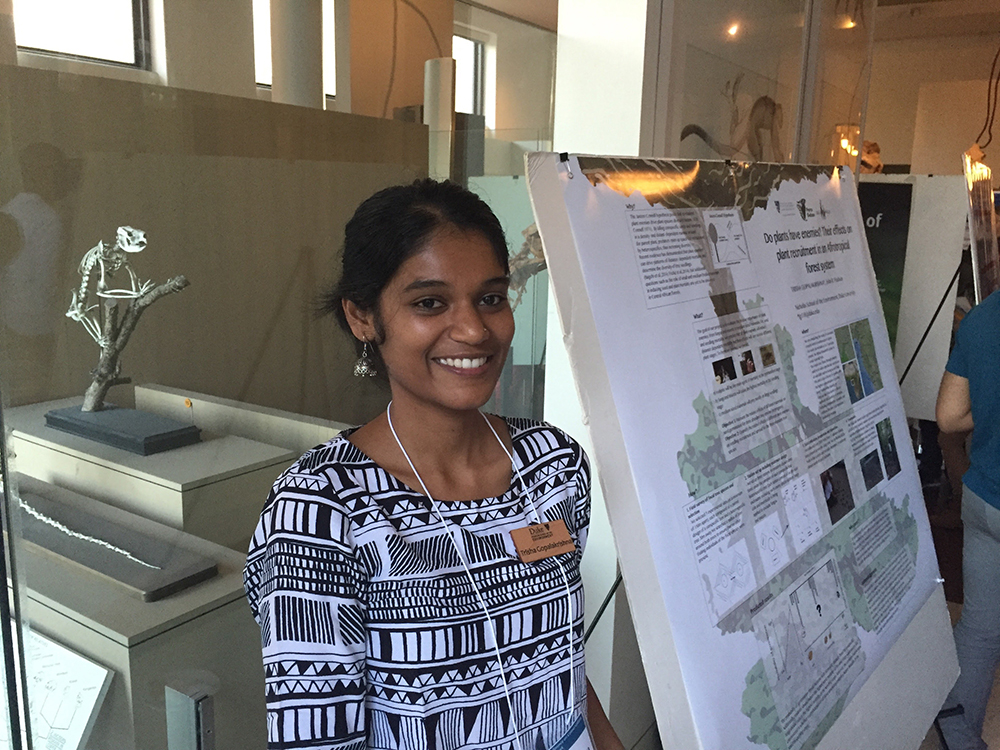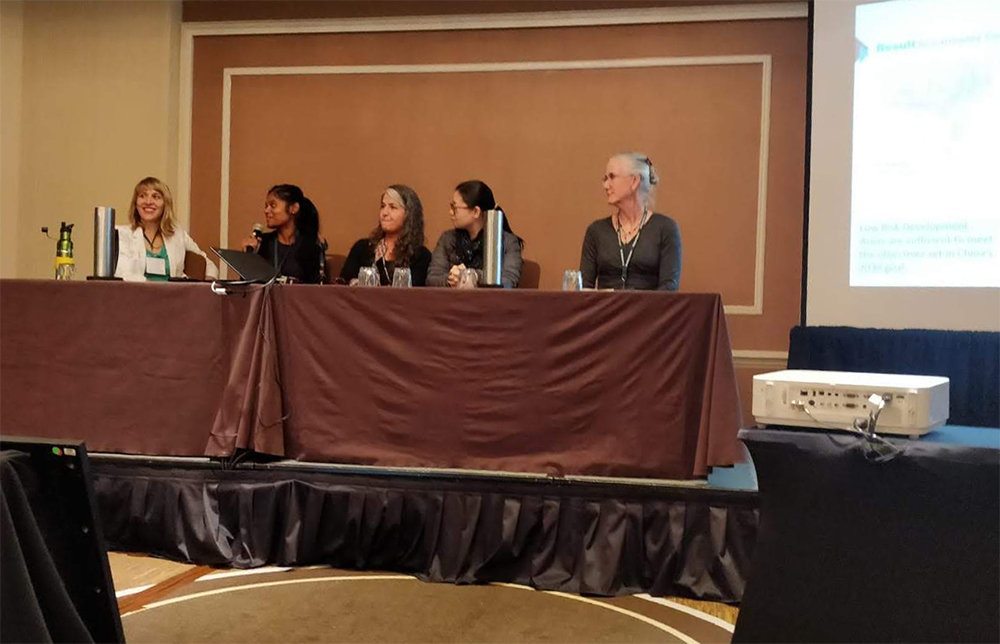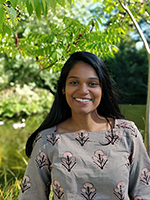How I have learned to get the most out of academic conferences
by Trisha Gopalakrishna, DPhil Candidate in the Ecosystems Lab Group, Environmental Change Institute.
I attended my first academic conference during the second year of my Master's in Ecosystem Science and Conservation (Environmental Management) in 2016, which I thought at the time was already arriving a bit late the party. I remember feeling overwhelmed and exhausted (physically and mentally), by the end of it. At the next conference that I attended in 2017, I had a better idea of what to expect, but still felt that I was not strategic in planning my days and I did not make enough use of the different sessions. Also, I still felt exhausted. Through personal experience of attending one to two conferences per year, since then and the sage advice from "The Unwritten Rules of PhD Research" by Gordon Rugg & Marian Petrie, I think I have finally come close to getting the most of my conference experience.
Here are a couple of things I now try to focus on:
1. Continually rehearse the reasons I am attending the conference
I remind myself that I am attending the conference to get to know other researchers and to learn about different research groups and academics. Networking does not come naturally to me and so preparations, even if it is getting into the mindset, works for me. I have realized that conferences are where I learn about the latest research news because many authors present studies that are probably still under peer review and have not yet been published. Also, there are often some great workshops that I can attend that help me learn new quantitative skills related to my research. Lastly, and most importantly, academic conferences are where I get to present my work and establish my research voice. And with that it is a great avenue to get thoughts and feedback on my research.
2. Two roles when attending a conference- as an attendee and as a presenter
Being a presenter is tough but is a great and easy way to connect with people who are interested in my research. Being an attendee requires lesser preparations, but more effort to network on the days of the conference.

3. Picking a conference has been, and still is, difficult
There is no right and wrong conference and I have learned that my choice completely depends on the size of the conference - large conferences have thousands of attendees and go on for a week or more, with a great variety of speakers, sessions and workshops but can be overwhelming for a novice versus small conferences. Theme specific or topic focused conferences versus general i.e. wider themed conferences, the time of year that the conference will occur, and the location are some other criteria I think about.
4. Start to plan for conferences in advance because it takes a lot of time to deal with all the logistics!
I do my best to research cheap modes of travel and for international conferences, make sure that I account for visa costs and processing time. I try to team up with someone I know attending as well to minimize accommodation costs and because conferences can get lonely. Being a vegetarian, I also scan the food options around the venue and prepare a daily meal budget. In addition to university and department scholarships and funds, there are many bursaries provided by conference hosts, especially for those from low and middle- income countries that anyone can apply for to offset costs. One good tip that I have heard of is that volunteering to work at the conference (running the reception desk for a couple of time slots, managing IT for a couple of sessions etc.) in exchange for a waiver on the registration is possible, if funds are tight.
5. Academic conferences generally have a standard format
There are three main categories that you can apply to present in:
- long talk/paper presentation, which is about 15-20 min and usually includes an entire analysis from start to finish;
- short/ lightning talk, which is about 5-7 min long, with or without 1-2 accompanying slides; and
- Poster, which is about making visual about your research, with minimal text. Usually, you are asked to explain your poster to people. Posters are underrated and sometimes considered less important or prestigious than talks. I think quite the contrary! Personally, I find it easier to be more creative when developing a poster and often spend less time making them. Also, though talks are attended by many people, there is more interaction when presenting and discussing a poster.
6. Application to a conference requires an abstract to be submitted
The hardest part about writing an abstract can be adhering to the word limit. An important skill is learning to write a compelling abstract with no results, for cases where you do not have any results at the time of submission but expect to by the time of the conference. In such cases, it can be helpful to write about expected results and the importance of the study in a convincing manner.
7. Do homework before leaving for the conference
I usually look at the list of attendees to see who I am interested in talking to and about what. I also take a close look at the schedule of different sessions, noting the time and rooms. I try to not fit in too much to avoid being exhausted from running between sessions. With virtual conferences, I plan breaks to avoid Zoom fatigue as most sessions are now recorded and available to view later.

8. Being an introvert, I must thoroughly prepare myself to 'work the room'
In order to network efficiently, I have started to prepare an introduction of myself and an elevator pitch of my work. I also reach out to a few folks via email or on social media and set up 20-minute coffee meetups. I start conversations by complimenting folks on their sessions, even those that do not entirely overlap with my interests. If I'm presenting, I make sure I introduce myself to the chair of the session I am presenting in, who then introduces me to others working on similar research! To manage exhaustion and feeling overwhelmed, I limit socializing to the workday, say 9-12 pm and 1-5pm, and keep the evenings free to do my own thing. I like to take time to explore the city, especially if it is in a place I have never been before. This helps me recuperate from the day and unwind from having to be present and focused the entire day.
9. Virtual conferences are becoming more common place, especially considering the COVID-19 pandemic
Twitter conferences are one of these virtual conferences that are becoming popular. Operationally, twitter conferences are like traditional conferences in that there are different categories to present in, different sessions and timings, but presentations are in the form of tweets. The tweets can follow a traditional introduction, methods, results, discussion format forming a twitter thread with lots of room for creativity in terms of GIFs, pictures of plots or graphs or maps, and even links to Youtube videos and interactive online content.
These are just some of the many ways in which I have become more confident about attending and presenting at conferences. I have found that a bit of planning and preparation has helped me get the most from conferences and even enjoy them! Lastly, conferences can be intense, especially for introverts. It's easy to try to do too much and then burn yourself out quickly. For me, learning how to balance socializing/networking with time for myself to recuperate and relax has been essential to an overall good conference experience.

Trisha Gopalakrishna is a DPhil Candidate in the Ecosystems Lab Group, Environmental Change Institute advised by Prof. Yadvinder Malhi. Her research is about restoration of forests and open ecosystems in tropical countries.
View her academic profile or follow her on Twitter and/or Linkedin.




